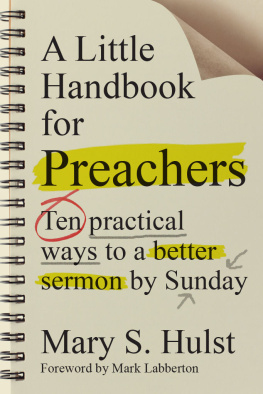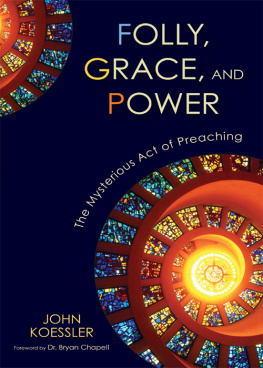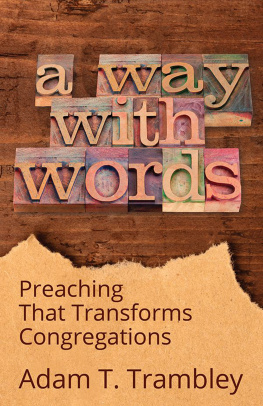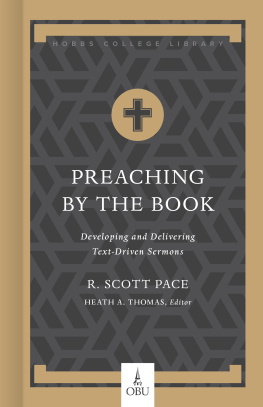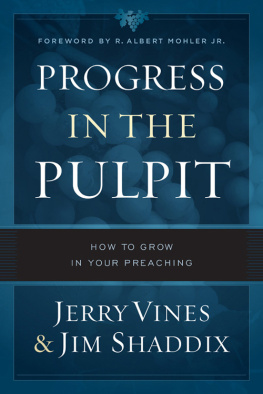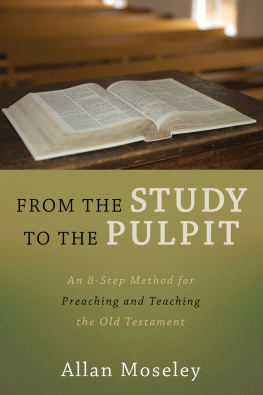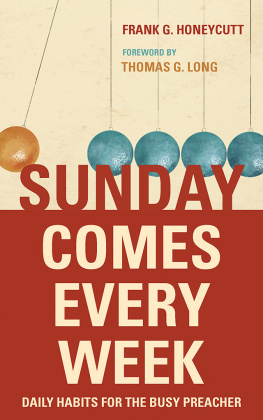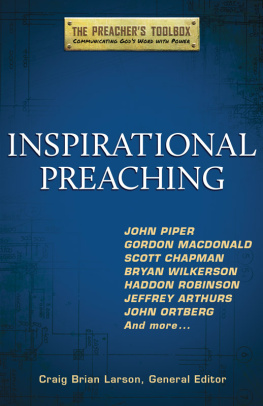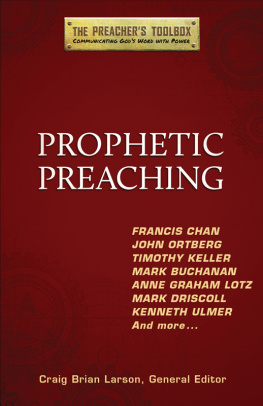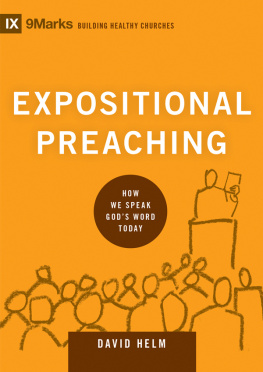
Lord, use this book to help your church.
Soli deo gloria.
Contents
Foreword
Mark Labberton
Praxis thats worth its salt is not just a Latin word for practice. Instead, it is a pointer to the convergence of theory and practice. Praxis holds ideas about something alongside and intertwined with our enactment of those ideas. The interaction, the corrective, the learning, the development of this dynamic relationship is our praxis.
Mary Hulst gives us here a book on the praxis of preaching. She artfully and pragmatically portrays theological and practical dimensions to preaching, surrendering neither and strengthening both. At times, Hulst is soaring in her vision of the nature of God who has spoken in Jesus Christ for the salvation of the world. This lands, however, as it does, in the solid reality (and mystery) of Gods Word made flesh. Jesus Christ is the incarnationthe praxisof Gods saving love.
All faithful preaching both points to the Word made flesh and makes that Word flesh to its hearers. Therein lies the dual challenge for good preaching praxis. Hulst takes one of the most daunting and urgent aspects of pastoral ministry and lays it out before us with the care and thoroughness of a wise practitioner. She wants to help nurture preaching praxis that is grounded in Scripture and in life, in theology and in discipleship, in concept and in expression, in framework and in delivery, in personal spiritual life and in communal life, in communication theory and in sermon delivery.
Though I am typically not one drawn to lists of 8 of this or 5 of that and 3 of the other, Hulst charms me by providing the kind of praxis help that I have sometimes needed and that I know others need too. She is not a mere sermonizer: she is a preacher who reflects on theology and the world, and a theologian who believes ordinary lives matter. No overdrawn hierarchies or exaggerated delineations between the elements. This feels like wisdom.
In the end, what I appreciate the most is that for Hulst praxis is not just the work of the preacher but eventually the work of every disciple. Strong preaching can be the catalyst for the process of Gods Word being made flesh in the lives of Gods people. When preaching does this work, it reflects the glorythe realityof the One who has spoken about God and incarnated the life of God. This is the good news that the church and the world long to hear and see. This is the good news that best enables those who hear it to live it, making the praxis of faith what it is meant to be.
Introduction
If youre new to preaching, overwhelmed and intimidated, this book is for you.
If youve been preaching for a while and youre burned out and weary, this book is for you.
If youre looking for fresh ways to think about sermon preparation, this book is for you.
If youd like some practical ways to enjoy preaching a little more, this book is for you.
If youre longing to have great conversations with your board, elders or congregation about preaching, this book is for you.
If youve gone to seminary or Bible college, this book will revive some of what you learned and hopefully will apply those lessons in helpful ways.
If youve not gone to seminary or Bible college, this book will give you a great place to start and point out other good books and resources that will help you.
If youre not a preacher, this book will be a behind-the-scenes tour of what goes into every sermon and will help you to listen better and help your preacher.
Theres a Sunday every week. And for those of us who preach every week, those Sundays come all too soon. Some weeks the sermon falls into place beautifully, our delivery is sparkling, the congregation is attentive and we remember why we love this work. Other weeksmany weekswe labor over commentaries, sketch out ideas, play with words, pray and practice and pray some more, and then we preach and it goes okay.
And for those of us who preach occasionally, it can be even harder to find a rhythm. Our sermon preparation time is stuck between our day job and the rest of life. Dwelling on a text, trying out ideas and practicing the sermon a time or two are luxuries. We long to preach well on a limited time budget.
Many of us know the creative mess that is preaching. We feel the frustration when things dont go the way we want and the delight when they do. There is much about preaching that is mysterious. And there is much about it that is incredibly practical. This book focuses on the latter.
This book is a practical guide to improving our preaching. Among other things, well talk about how to engage the Bible, how to focus on God, how to preach grace, how to deliver messages well and how to talk with your listeners about your preaching. Each chapter will give advice and suggestions to try.
You may want to read one chapter, work on that idea for a while and then move on to another chapter. You may want to skip ahead to a chapter you are most interested in. You may want to read through this book with a colleague or a small group. This book is a tool to help us preach better. How you use and apply the information here is up to you!
However you choose to engage this book, its my hope that it encourages you in the act of preaching. Whether you preach sermons or listen to them, whether you teach people how to preach or have never been in a preaching class, my prayer is that this book will help you love preaching, love the Word, love the listeners and most of all love God even more.
As you read, note that all stories are fictional, though many are based on conversations Ive had. For stories out of my own teaching, all identifying details have been changed to protect the identity of the students. Some of the material in chapter ten, Getting Feedback About Your Preaching, first appeared in The Banner (Preachers Are Like Peaches, December 23, 2012) and in The Calvin Theological Seminary Forum (Not at the Door: Thoughts on When and Where to Talk About Sermons, Winter 2008).
When it comes to preaching, I too am trying my best. I would love to say that I hit the mark every week, and that I easily do everything I suggest in these pages. I dont. I try. I pray and read and write and practice, and then I preach. What keeps me at it, week after week, is what keeps all of us at it: we believe that God Almighty, Lord of heaven and earth, actually uses people like us to proclaim the mysteries of faith, and we are thrilled and humbled at this calling. So we try things and experiment and work hard, because there is nothing we would rather spend our lives getting right. Im honored to be your companion in this work.
one
Biblical Preaching
Falling in Love with the Word
Most of us long to preach because there was something about the gospel story that grabbed us. For some of us it was because the gospel was our foundation in an otherwise unstable childhood. We may remember the flannel graphs and filmstrips that taught us about a God who cared deeply for his peoplewho cared deeply for us. For others the good news about Jesus echoed in the life of a parent or grandparent who shared his or her testimony with us again and again, shaping our own lives. Still others, like Paul, had our own Damascus Road moment, and we preach the good news because God gave us our lives back. Some of us left other careerscareers in which we made more money, had more prestige or were looking at a more secure retirementin order to preach.
We love the gospel story. We love this story of a God who runs after his people and never lets them go. We love the stories that are easier to preachanything out of Luke 15, the Daniel story of the three men in the fiery furnace, Jesus inviting the children to comeand we willingly wrestle with the passages that seem opaque, confusing or even dangerous, as when Jesus rejects his family or curses the fig tree, or most of the book of Judges.

